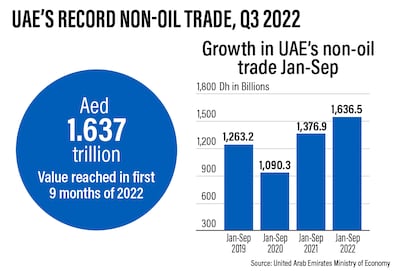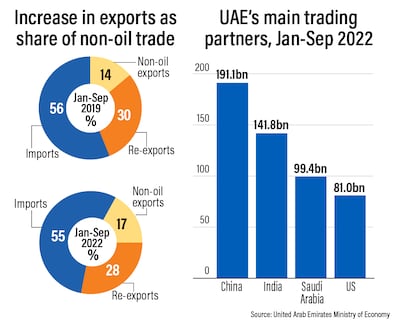The UAE’s foreign trade is expected to reach Dh2.2 trillion ($599.4 billion) by the end of 2022 as the Arab world’s second largest economy proves to be an exception, going against the weakening global trade growth trend amid growing macroeconomic headwinds, Sheikh Mohammed bin Rashid, Vice President and Ruler of Dubai has said.
The Emirates, which recorded a foreign trade volume of Dh1.9 trillion at the end of 2021, expects 15 per cent growth this year, a significant increase compared with the World Trade Organisation’s 3.5 per cent growth expectation for global trade, Sheikh Mohammed tweeted on Wednesday.
“The UAE constitutes an exception in global trade and economy, it constitutes an exception in terms of services and infrastructure [and] it constitutes an exception in distinguished and stable international relations,” Sheikh Mohammed said.
The economy, which bounced back strongly last year, has picked up further growth momentum this year, despite global headwinds and fears of a looming global recession. It is set to grow by more than 6 per cent this year, after expanding by 3.8 per cent in 2021, buttressed by a rebound in tourism, construction and activity related to the Expo 2020 Dubai, according to the International Monetary Fund.
Six per cent growth this year would be the highest since 2011, when the economy grew by 6.9 per cent.
Emirates NBD, Dubai's biggest lender, recently raised its UAE growth forecast to 7 per cent in 2022. Abu Dhabi Commercial Bank projects growth of 6.5 per cent.
The value of non-oil foreign trade, a central plank of the UAE's efforts to diversify its economy, grew to Dh583 billion at the end of the third quarter of this year, the highest-ever quarterly trade figure for the country.
It jumped 11 per cent from the preceding quarter and 23 per cent on an annual basis, Dr Thani Al Zeyoudi, Minister of State for Foreign Trade, said in a post on LinkedIn.

The third-quarter export value hit Dh97 billion, another quarterly record that demonstrates the progress being made in the UAE's industrial, manufacturing and service sectors, he said.
For the first nine months of this year, non-oil foreign trade jumped almost 19 per cent on an annual basis to Dh1.64 trillion. The nine-month trade value was 50 per cent more than the same period in 2020.
Nine-month exports, meanwhile, reached Dh275 billion and accounted for almost 20 per cent of the UAE's total trade, a significant jump from 11 per cent just five years ago, he said.
"The UAE’s non-oil foreign trade continues to break all records, underlining our belief that trade is a principal driver of growth, opportunity and sustainable development," Dr Al Zeyoudi added.
Growing foreign trade is part of the UAE's plans to double the size of its economy to Dh3 trillion, from Dh1.4 trillion, by 2030. The country is keen to build economic partnerships and aims to develop closer trade and investment relations with key partners around the world.
The UAE aims to conclude at least 22 Comprehensive Economic Partnership Agreements by 2031 with individual countries and major economic blocs, Dr Al Zeyoudi told The National earlier this week, as the country started trade talks with Ukraine.

The UAE aims to complete two Cepas before the end of this year and expects to wrap up another four before the end of the first half of 2023 to boost bilateral trade and investments.
The Ministry of Economy expects to conclude Cepas with Turkey and Colombia before the end of this year. Plans are afoot to complete deals with Georgia, Cambodia, Kenya and Ukraine by the middle of next year.
The latest foreign trade figures reflect the country's "agenda to cement deeper, stronger trade ties with key nations around the world", Dr Al Zeyoudi said, adding that Cepas with Indonesia and Israel would come into force soon and negotiations with other major economies will conclude.
"Our trade agenda is delivering real, tangible benefits and confirming our status as an international hub for commerce," he said.



